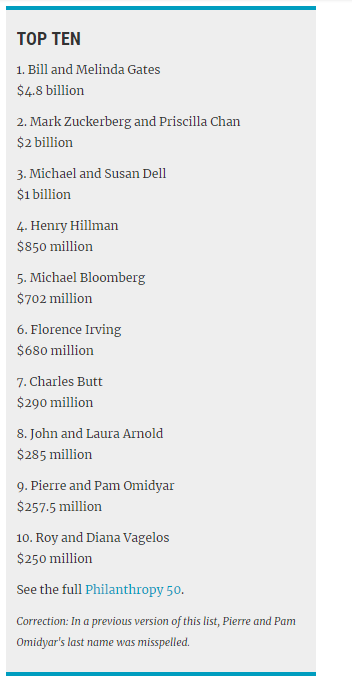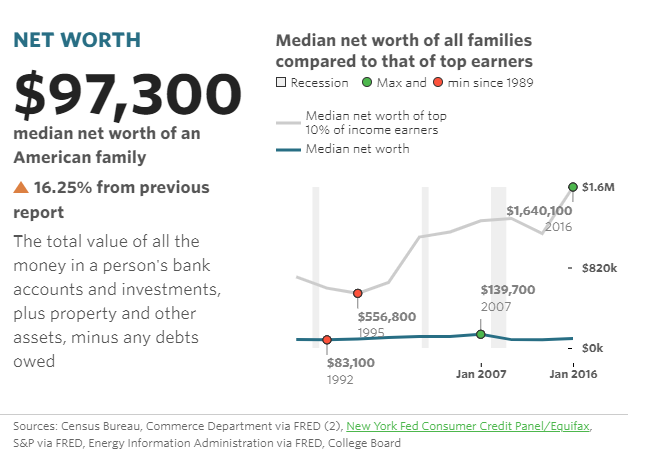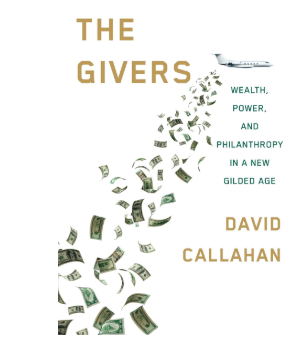PHILANTHROPIC ACTIVISM — THE SUPER RICH AND THEIR ABILITY TO AFFECT CHANGE
PHILANTHROPIC ACTIVISM — THE SUPER RICH AND THEIR ABILITY TO AFFECT CHANGE
Andrea McManus, ViTreo Group Inc
January 22nd 2019
“When you have $163 billion, you have enormous power to impose your own preferences on society…There’s a fascination with the good he can do, along with a concern about the power of one individual who’s not accountable to voters or even to market forces.”
(Bezos $2 billion charity pledge not necessarily great news for America)
The numbers aren’t available yet for 2018, but in 2017, the 50 most generous donors in the U.S. collectively gave $14.7 billion with the median giving among them reaching $97 million. This is nearly double what it was in 2000, when The Chronicle first conducted its Philanthropy 50 analysis. “The 2017 giving spree was fueled by huge donations from many relatively young major philanthropists who are still accumulating great wealth — and who are likely to make big gifts for years to come.”(Chronicle of Philanthropy America's Superrich Made Record Donations)
To learn more about Canada’s Richest People and where they give visit - Canadian Business Where Canada's Richest people donate their money
In 2018, the world’s richest couple, Jeff and MacKenzie Bezos, pledged to put their vast resources towards solving homelessness and early childhood education for low-income children. Experts say that’s the good news. They also say there’s a catch. The concern is that, on one hand, this is an incredibly generous gift, but it is a gift that also symbolizes the gap between the rich and the poor in America. (Bezos $2 billion charity pledge not necessarily great news for America)
“Giving patterns in the last decade have suggested that a greater proportion of total charity is coming from the largest givers,” said Ben Soskis, a research associate at the Urban Institute, a Washington, D.C. based think tank. “Charitable giving is reflecting the income inequality of the nation.”
“While the economy is rebounding, unemployment has dropped, and wages are finally starting to grow, the gulf between the wealthiest and poorest households remains vast. The top 1% of Americans made 26.3 times as much income as the bottom 99% in 2015 — an increase from 2013, when they earned 25.3 times as much, according to a recent study by the Economic Policy Institute, a left-leaning Washington, D.C. think tank. That gulf is reflected in how Americans give to charity.”
(Bezos $2 billion charity pledge not necessarily great news for America)
Soskis goes on to comment that along with the type of wealth someone like Bezos has acquired, comes tremendous power to influence and impose his or her values and preferences on society.
Vision without action is merely a dream.
Action without vision is merely passing the time.
Vision with action can change the world.
– Chinese Proverb
In some media, questions are being asked about the Bezos’ pledge. Among them - What will the structure be? Why only $2 billion? Why homelessness and early education? And especially, Why now? Is it because Amazon is under scrutiny? Was his announcement simply a PR tactic? Why so little? – “He is committing about 1.3 percent of his total net worth during a year in which his pocketbook doubled in size thanks to Amazon’s bull run, according to Forbes.” (sources: CNBC 2 billion philanthropic fund faces many questions and Recode Charity Amazon CEO)
There are also positive responses to his donation.
“‘One very important difference in Bezos’s approach is how he’s focused on more near-term issues, as opposed to other super rich people who tend to support more ambitious projects, like curing cancer,’ said Lenkowsky. [Leslie Lenkowsky is a philanthropic studies professor at Indiana University.]
‘It’s a much more realistic approach,’ Lenkowsky said. ‘He is doing philanthropy in a way that we have not seen people of his wealth do it in a long time.’ ” (CNBC 2 billion philanthropic fund faces many questions)
What do you think? Are you concerned about the impact of these enormous gifts? Or do you feel these are positive events for humankind? And if people are being helped, do you think it matters what the motives are?
According to the report Gilded Giving 2018: Top-Heavy Philanthropy and its Risk to the Independent Sector authored by the Institute for Policy Studies, the phenomenon of a top-heavy charitable sector in the U.S. presents some issues for both the nonprofit sector (which I’ll explore in next week’s The Provocateur - The Super Rich Donor - What are the risks and opportunities for our sector?) and for society as a whole.
The report states:
“tax avoidance and self-dealing, the warehousing of wealth in the face of urgent needs; and the increasing use of philanthropy to protect power and privilege. To address these risks, the report's authors call for an increase in the annual payout requirement for private foundations; reforming the rules governing DAFs to require distribution of donations within three years; banning gifts from private foundations to DAFs, and vice-versa; and establishing a universal charitable deduction to encourage giving by low- and middle-income givers.
‘Charity is now becoming increasingly undemocratic, with organizations relying more and more on larger donations from smaller numbers of wealthy donors while receiving shrinking amounts of revenue from donors at lower- and middle-income levels,’ said Helen Flannery, associate fellow at the institute and a co-author of the report.
‘There's nothing wrong with wealthy people giving bigger gifts to charitable causes that can improve society,’ said Josh Hoxie, director of the institute's Project on Opportunity and Taxation. ‘The problem is the rules regulating our charitable sector have become skewed toward prioritizing tax write-offs for the ultra-wealthy and not toward solving social problems.’ “ (source: Philanthropy News Digest - Warns Of Risks Of Top Heavy Philanthropy)
Bezos’ ‘act of generosity’ is not the only one that some consider suspect. Some label the Chan Zuckerberg initiative as ‘philanthrocapitalism’ and express concern these billionaire philanthropists are donating money to fix problems their companies created… In its article, The Trouble with Charitable Billionaires, the Guardian writes:
“decidedly not a charity organisation – means that Zuckerberg can control the company’s investments as he sees fit, while accruing significant commercial, tax and political benefits. All of this is not to say that Zuckerberg’s motives do not include some expression of his own generosity or some genuine desire for humanity’s wellbeing and equality.
What it does suggest, however, is that when it comes to giving, the CEO approach is one in which there is no apparent incompatibility between being generous, seeking to retain control over what is given, and the expectation of reaping benefits in return. This reformulation of generosity – in which it is no longer considered incompatible with control and self-interest – is a hallmark of the ‘CEO society’: a society where the values associated with corporate leadership are applied to all dimensions of human endeavour.” (source: The Guardian The Trouble with Charitable Billionaires)
In Decolonizing Wealth, award-winning Native American funder Edgar Villanueva’s 2018 book which has been receiving significant attention, addresses what he refers to as ‘the dysfunctional colonial dynamics at play in philanthropy and finance.’ According to Villanueva, the core problem with philanthropy is colonialism. That donors and funders reinforce the divide between Us and Them, the Haves and the Have Nots and are comprised mainly of white saviours and experts vs. the poor, the needy, those at risk and the marginalized. (Decolonizing Wealth by Edgar Villanueva, 2018)
That certainly is a different perspective. Have you come across people who view philanthropy from this angle?
In their 2014 paper, Questioning generosity in the golden age of philanthropy: Towards critical geographies of super-philanthropy, human geographers Iain Hay and Samantha Muller refer to what is occurring with donations by the super wealthy skeptically as a “golden age of philanthropy”. They write that these philanthropists bring an “entrepreneurial disposition” and suggest that these donations have been:
“diverting attention and resources away from the failings of contemporary manifestations of capitalism”, and may also be serving as a substitute for public spending withdrawn by the state…Exploitative labour practices or corporate malpractice are swept under the carpet as companies publicise tax-efficient contributions to good causes. Such contributions may be a relatively small price to pay compared with changing fundamental operational practices. Likewise, giving to charity is a prime opportunity for CEOs to be seen to be doing good without having to sacrifice their commitment to making profit at any social cost. Charitable activity permits CEOs to be philanthropic rather than economically progressive or politically democratic." (The Guardian The Trouble with Charitable Billionaires)
David Callahan, author of The Givers, which I wrote about in last week’s blog Super Rich Philanthropists - Are they different than previous generations? talks about how he received accolades for his book, as well as criticism for letting wealthy donors off the hook.
Pablo Eisenberg, recently said in the Chronicle of Philanthropy about The Givers: "Mr. Callahan doesn't seem overly perturbed by the scenario he has painted in which the rich receive enormous tax subsidies paid by ordinary citizens to maintain and increase their power and influence over everyone else… he refrains from sounding the alarm.”
Robert Kaiser, reviewing the book in the Washington Post, said similarly: “Callahan’s account of how the rich exercise power in modern America is ominous and grim, though he avoids drawing the darkest conclusions his evidence would support."
Along with another reviewer, Stan Katz, Eisenberg also faults The Givers for a pollyanna-ish view of mega-donors. As Eisenberg says,
“Mr. Callahan would have us believe that most very wealthy donors are nice people who want to do good things for society. That may be true for many of them, but others also are arrogant and scornful of democratic processes. Some are rigid ideologues who relish exercising power.”
In the conclusion of the book, I write, "Philanthropy now acts as a driver of the growing divide in America in who gets heard in the public square—along with who sets the agenda—both nationally and locally. Giving by the wealthy is amplifying their voice at the expense of ordinary citizens, complementing other tools of upper-class dominance.”
Read the entire article and Callahan’s responses here - Inside Philanthropy Debating Big Philanthropy Criticisms.
There’s an old saying “There’s no free lunch.” Does this apply here? And does it mean we (we being the rest of society and those who benefit from the largesse of the uber-rich) should just be grateful for the billions of dollars donated by the Bezos’s, Zuckerberg/Chans, Gates’s and Buffets of the world?
And here’s a few more questions. Are we or should we, be in a position to cast a skeptical eye on motives for giving? What is different now that couldn’t be applied to the big givers in the first gilded age, the people who shaped philanthropy and fundraising in North America? Why is one person’s (or a couple’s) motivation more worthy than another’s?
Interested to hear what you think…
Check out ViTreo's Braintrust as we bring you additional insights into what is and what will be important in philanthropy through our Weekly News Recap and our Podcast.
ABOUT THE AUTHOR
Andrea McManus, Chair, Board of Directors, Partner
ViTreo Group Inc
Andrea McManus is a Partner with ViTreo with over 30 years’ experience in fund development, marketing, sponsorship and nonprofit management. A highly strategic thinker and change maker, Andrea has worked with organizations that span the nonprofit sector with particular focus on building long-term and sustainable capacity.









